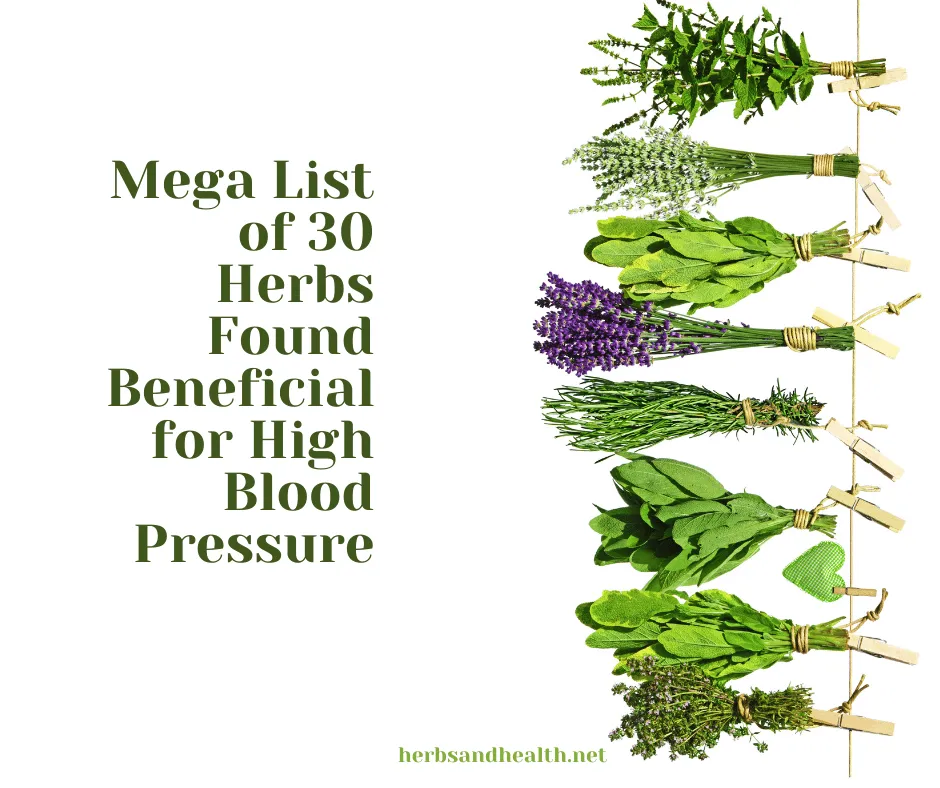Mega List of 30 Herbs Commonly Discussed in Traditional Wellness for Blood Pressure Balance
Many cultures around the world have long included herbs as part of general wellness routines. Some of these plants are often discussed in relation to cardiovascular balance and healthy lifestyle habits.
This article explores 30 herbs traditionally referenced in wellness practices, focusing on their historical use and general context — not as treatments or cures.
Important Note:
This content is for general informational purposes only. These herbs are not treatments for high blood pressure, and individual responses vary. Always consult a qualified professional for medical advice.
🌿 Why Herbs Appear in Wellness Discussions
Herbs are often included in daily routines because they:
- Are plant‑based and widely used in traditional cultures
- Are commonly prepared as teas, infusions, or foods
- Fit into broader lifestyle habits such as balanced eating and hydration
Modern research continues to explore these plants, but traditional use does not equal medical effectiveness.
🌱 30 Herbs Commonly Referenced in Traditional Wellness
1. Hawthorn (Crataegus spp.)
Traditionally mentioned in European herbal practices related to general cardiovascular wellness.
2. Basil (Ocimum basilicum)
A culinary herb often included in balanced diets and plant‑forward meals.
3. Cinnamon (Cinnamomum verum)
Commonly used as a spice and discussed in traditional food‑based wellness routines.
4. Garlic (Allium sativum)
Widely consumed worldwide as a food ingredient and part of traditional diets.
5. Ginger (Zingiber officinale)
Often prepared as tea and discussed in general digestive and wellness contexts.
6. Turmeric (Curcuma longa)
A culinary spice traditionally included in plant‑based food traditions.
7. Coriander (Coriandrum sativum)
Used both as a spice and fresh herb in many cultural cuisines.
8. Cardamom (Elettaria cardamomum)
Commonly used in teas and traditional beverages.
9. Lavender (Lavandula angustifolia)
Traditionally associated with calming routines and aromatherapy.
10. Hibiscus (Hibiscus sabdariffa)
Often consumed as an herbal tea in various cultures.
11. Green Tea (Camellia sinensis)
A widely consumed beverage associated with general lifestyle habits.
12. Rosemary (Rosmarinus officinalis)
Aromatic herb used in cooking and traditional practices.
13. Valerian (Valeriana officinalis)
Historically discussed in traditional relaxation routines.
14. Ginseng (Panax ginseng)
Mentioned in traditional systems for general vitality.
15. Cayenne Pepper (Capsicum annuum)
Used as a spice in many global cuisines.
16. Fenugreek (Trigonella foenum‑graecum)
Traditionally included in food and spice blends.
17. Lemon Balm (Melissa officinalis)
Often prepared as tea in traditional wellness contexts.
18. Dandelion (Taraxacum officinale)
Historically consumed as both food and tea.
19. Parsley (Petroselinum crispum)
Common culinary herb used fresh in meals.
20. Black Seed (Nigella sativa)
Referenced in traditional systems across cultures.
21. Motherwort (Leonurus cardiaca)
Historically discussed in European herbal traditions.
22. Olive Leaf (Olea europaea)
Derived from the olive tree, long used in Mediterranean traditions.
23. Thyme (Thymus vulgaris)
A culinary herb often included in savory dishes.
24. Oregano (Origanum vulgare)
Used fresh or dried in plant‑based cooking.
25. Celery Seed (Apium graveolens)
Traditionally referenced in food‑based practices.
26. Sage (Salvia officinalis)
Used in cooking and traditional preparations.
27. Neem (Azadirachta indica)
Traditionally used in various non‑culinary wellness practices.
👉 Related guide: Neem Leaves – Traditional Uses & Safety
28. Moringa (Moringa oleifera)
A nutrient‑dense leafy plant commonly discussed in wellness circles.
👉 Related guide: Moringa Leaves: Benefits & Safe Use
29. Molokhia (Corchorus olitorius)
A leafy green traditionally consumed as food in several regions.
👉 Related guide: Molokhia Leaves – What It Is & How It’s Used
30. Ashwagandha (Withania somnifera)
Often mentioned in stress‑related wellness discussions.
👉 Safety‑focused read: Who Should NOT Take Ashwagandha?
🧠 How to Approach Herbal Information Safely
- Herbs should be viewed as cultural and dietary components, not medicines
- Effects can vary based on health status, medications, and preparation methods
- Combining herbs with prescribed medication should always be discussed with a professional
🌿 Final Thoughts
This list reflects how herbs have been traditionally referenced in wellness conversations, not as medical solutions. Many people enjoy learning about plants as part of a broader interest in natural foods, cultural traditions, and balanced lifestyles.
For a plant‑forward eating approach, you may also explore:
- The Alkaline Diet: A Plant‑Focused Wellness Guide
- Clove Water & Herbal Drinks in Daily Routines
- Digestive Wellness & IBS: A General Overview
🟩 This article has been reviewed and updated to improve clarity, neutrality, and informational accuracy.
